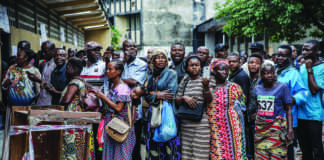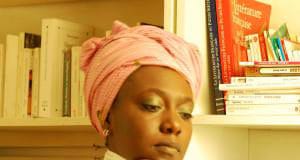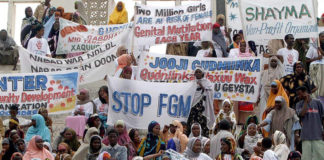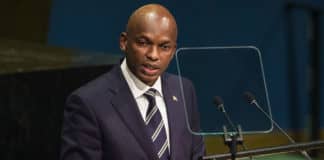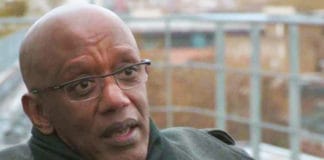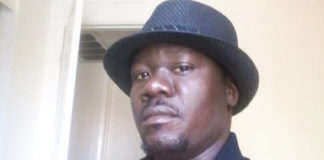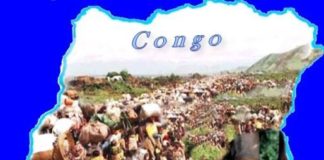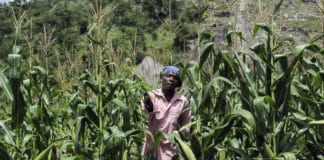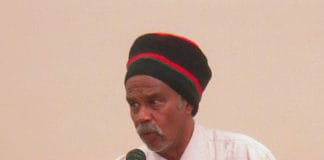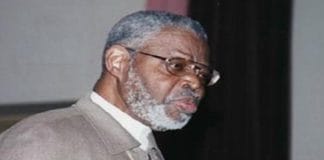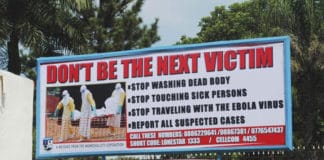Tags Sudan
Tag: Sudan
Is Rwanda under Kagame a shining example of good news from...
In an article titled “Rwanda Is a Shining Example of Good News from Africa” published in Stuff, writer Phil Quin has a line that I love: “But the truth, as always, is more nuanced and, especially over the past decade or so, Africa is in many ways coming into its own.”
Congo in the abyss
On Feb. 12, 2018, the UN High Commissioner for Refugees reported that there were 4.49 million internally displaced persons (IDPs) in the Democratic Republic of Congo and 630,500 refugees in neighboring countries. The IDP population had nearly doubled in the previous year alone, mainly as a result of clashes and armed attacks. This week I spoke to Swiss Congolese historian and activist Bénédicte Kumbi Ndjoko about recent developments in the Democratic Republic of the Congo.
America, Uganda and the War on Terror – a book review
Helen Epstein’s new book, “Another Fine Mess: America, Uganda, and the War on Terror,” is dense with detailed and fascinating accounts of events in Ugandan history and politics and those of neighboring nations. I’m familiar with much of it, but there’s also much I hadn’t known, some I disagree with, and elaborations or different interpretations of what I’ve previously read or been told.
Africans organize to end the widespread practice of Female Genital Mutilation
Feb. 6 is the international day for the abolition of all kinds of female genital mutilation and cutting. The practice of FGM/C in Africa and the Middle East is a thousand-year-old tradition consisting in cutting the clitoris of baby girls, teenagers and women with a razor blade or an ugly special knife. While the exact number of girls and women worldwide who have undergone FGM/C remains unknown, at least 200 million girls and women in 30 countries have been subjected to the practice.
Pentagon Human Rights Auxiliary pushes ICC to indict Burundi
In October 2016, the tiny East African nation of Burundi made history by raising an independent head against U.S. empire. Its legislature voted to withdraw from membership in the International Criminal Court, a tool that the U.S. and its Western allies use to discipline unruly African leaders – especially those who sign resource extraction contracts with Russia or China and/or those who try to do anything for their own people. The Burundian government fits both descriptions.
Rwanda, Paul Kagame’s economic mirage: an interview with David Himbara
The 1994 bloodbath in Rwanda also became an argument for the suppression or even criminalization of speech. No one makes these arguments more fiercely and absolutely than Rwandan President Paul Kagame. Kagame claims to have inspired Rwandans to rise from the ashes to build an economic miracle and example for all Africa. In a new book, however, economist David Himbara says that Kagame’s economic miracle is in fact an economic mirage. I spoke to David Himbara.
Alfred Olango, killed by California cop, dreamt of opening family restaurant
He overcame a childhood of hunger in war-torn parts of Africa and came to America with the dream of opening a restaurant with his family. That dream ended with the death of Alfred Olango, 38, who was killed on Tuesday in El Cajon, California, when two officers responding to a report of a mentally ill man shot Olango after they said he pulled an unidentified object from his pants pocket and appeared to move into a “shooting stance.”
Who is killing indigenous people in Beni, DR Congo?
Beni Territory is a vivid example of the phrase, “Everybody wants a piece of Congo.” Beni Territory is rich in oil, timber, gold, diamonds, wolfram, coltan and cassiterite. Now the people of Beni are being massacred for their land and its riches. KPFA’s Ann Garrison filed this report after speaking to a Congolese human rights defender and author of “Congolese Genocides from Leopold II to Paul Kagame,” Boniface Musavuli.
Looking at Mugabe’s Zimbabwe and the African Union in 2015: an...
2015 was a historic political year for the African continent because one of the continent’s most radical anti-imperialist leaders chaired the African Union, and I am talking about President Robert Mugabe of Zimbabwe. I talked with Obi Egbuna, the U.S. correspondent for the Zimbabwean national newspaper, The Herald, about what President Mugabe accomplished leading Zimbabwe and the African Union in 2015. Here is what he had to say.
Dedon Kamathi: To challenge the U.S. Empire
Former Congresswoman Cynthia McKinney writes that this statement, found after Dedon Kamathi’s death earlier this month, is a “letter that Dedon wrote in the case of his demise during the trip that he and I took together to Syria while it was under attack from U.S. imperial forces. This letter, I believe, is critical to understand who Dedon was and how committed he was to his community. He was ready to give his life for his beliefs and for us.”
An appreciation: Dr. Ben, legendary Egypt scholar, dean of Harlem Street...
Yosef Alfredo Antonio ben-Jochannan, known to the African world as “Dr. Ben,” believed that education belonged to any member of his race who wanted it. Perhaps it was because he believed that if his people knew their collective root, their ancient greatness, they would fight for their freedom and achieve it. Dr. Ben, one of the founding scholars and lecturers in what is now known as Africana Studies, died last week after a long illness. He was 96.
Ebola, the African Union and bioeconomic warfare
As the Ebola outbreak rages and there are projections of more than 1.4 million persons infected in the next few months, the African Union and the regional bloc ECOWAS have taken a back seat as the international media uses this virus to stigmatize Africa and Africans. Pious statements have been made by the World Health Organization (WHO) as the World Bank warns that Ebola could have “catastrophic” economic costs on the region of Western Africa.
African migrants to Israel, ‘We are human beings too’
The scene should hugely embarrass all Israelis and supporters of Israel: tens of thousands of African immigrants demonstrating, demanding to be treated as human beings within a state that claimed to be created as a safe haven for immigrants. The lie is exposed for all to see. African refugees are striving to receive attention from the international community in hopes that it might help push Israelis to provide them the opportunity to live in peace within Israel.
Syria, Congo and the ‘Responsibility to Protect’: the US double standard
Earlier this year, President Obama asked how one might weigh the “tens of thousands who’ve been killed in Syria versus the tens of thousands who are currently being killed in the Congo.” But as tragic and devastating as the Congo conflict is, Congolese are not asking for the United States – or the international community – to militarily intervene.
Wanda’s Picks for September 2013
On the 20th anniversary of the demise of my father, Fred Ali Batin Sr., the 18th anniversary of the Maafa Commemoration San Francisco Bay Area – the Ritual Sunday is Oct. 13, 2013; see http://maafasfbayarea.com/ – and approximately the 60th day of the hunger strike to end the inhuman conditions in California’s Security Housing Units or SHUs, I just want to pause and reflect.
Women of the Congo decry U.S. neocolonialism
This letter, signed by Diaspora Congolese women in the U.S., U.K., Belgium, France and South Africa, was delivered to Ambassador Carson on March 20. We are writing to you with regard to the current U.S. policy position on “Lasting Solution to Instability” in the Democratic Republic of the Congo (DRC), which you presented on Feb. 11, 2013, at the Brookings Institution in Washington, D.C.
India emerges as leader in 21st century ‘Scramble for Africa’
“Africa shining” is just as potent a mirage as “India shining”; the shine is restricted to the economic and political elite on both sides of the Indian Ocean. African leaders – both elected politicians and traditional chiefs share the responsibility for allowing the pillage of their continent in the name of economic growth and development.
Obama administration official provides insights on U.S. Congo policy
On Monday, Feb. 11, outgoing Assistant Secretary of State for African Affairs Johnnie Carson presented an outline of the Obama administration’s policy position on the situation in the Democratic Republic of the Congo. The purpose of Ambassador Carson’s presentation was twofold: discussing why efforts should be redoubled to bring stability to the Congo and laying out a framework for “moving forward.”
Wanda’s Picks for January 2013
This year, on the 150 anniversary of the Emancipation Proclamation, we all need to heed the words of Sister Jayne Cortez: “And if we don’t fight / if we don’t resist / if we don’t organize and unify and / get the power to control our own lives / Then we will wear / the exaggerated look of captivity ...” And don't miss Wanda's excellent, no holds barred reviews of “Django Unchained,” “Lincoln and “Red Hook Summer,” plus Dr. King birthday events listing and much more
U.S. deploying troops to 35 African countries
Soldiers will begin training in March 2013 in order to prepare for a project that will send troops to as many as 35 African nations. Citing a growing threat from extremist groups, including those with ties to al-Qaeda, the Department of Defense is hoping to install American soldiers overseas in order to prepare local troops there for any future crises as tensions escalate.




